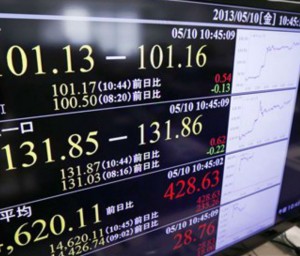Dollar rises above 100 yen for first time in 4 years

A screen indicates the U.S. dollar against the Japanese yen, top, and Nikkei 225 index, bottom, at a foreign exchange company in Tokyo, Friday, May 10, 2013. Japan’s benchmark stock index surged Friday after the dollar hit a four-year high against the yen. The Nikkei 225 index in Tokyo jumped 2.8 percent to 14,581.95 after the dollar traded above 100 yen for the first time since April 2009. Traders have been selling the Japanese currency in reaction to moves by the government of Prime Minister Shinzo Abe to stimulate the economy by pursuing super-loose monetary policy. (AP Photo/Kyodo News) JAPAN OUT, MANDATORY CREDIT
TOKYO—The dollar soared above 100 yen for the first time in more than four years Friday, driven by improved U.S. economic figures and Tokyo’s aggressive credit-easing that aims to revive Japan’s sluggish economy.
The U.S. dollar rose as high as 101.18 yen, the first time since April 2009 that the greenback has traded above 100 yen. The move lifted Japanese stocks to their highest level in more than five years.
The weaker yen is a boon to Japan’s major auto and electronics exporters. The government said the yen’s fall signalled that Prime Minister Shinzo Abe’s policy mix of increased public spending and aggressive monetary easing, dubbed “Abenomics,” was proving successful. Kick-starting the economy has been Abe’s top priority since he took office late last year.
“With Abenomics, we hope that the Japanese economy will grow and can contribute to the global economy,” said Yoshihide Suga, the chief Cabinet spokesman. “It’s better that stocks are high than low. We believe this is a sign that our policies are progressing well.”
Japan’s Nikkei 225 stock average was up 3.1 percent in afternoon trading at 14,629.80, the highest since January 2008.
Japan’s monetary easing, and expectations it will help reverse persistent deflation, have helped drive the value of the yen down by more than 20 percent against the dollar since October, when it was trading at around 78 yen.
The yen’s sustained fall has riled some of Japan’s trading partners but generally won support from leaders of other big economies eager to see the world’s third-biggest economy recover from two decades of stagnation. Abe has pushed both fiscal and monetary stimulus strategies to help Japan end a long bout of deflation and support domestic demand.
Optimism about the U.S. economy also lifted the dollar after several positive indicators were released. The Labor Department said Thursday that unemployment claims fell to the lowest level in more than five years. And last week, figures showed that the U.S. economy had added 165,000 jobs in April, lowering the unemployment rate fell to 7.5 percent.
“Worries began to grow that U.S. economy wasn’t doing so well, but in May the figures improved. So with concerns about the U.S. easing, the dollar is rising,” said Takuya Kanda, a currency analyst at Gaitame.com Research Institute in Tokyo.
“If U.S. economy improves, and the Bank of Japan’s aggressive easing continues … that will lead to further dollar strength and yen weakness,” said Kanda, who predicts the dollar will rise to 110 yen this year.
A weaker yen helps Japan’s key exporters by boosting overseas earnings when repatriated and by making goods produced within Japan for export more affordable in markets abroad. However, it raises costs in yen terms of the imported crude oil and natural gas that resource-scarce Japan must rely on to keep its industries humming and power its cities.
The central bank, under its new governor Haruhiko Kuroda, has vowed to double the monetary base through purchases of government bonds to meet a 2 percent inflation target within the next two years.
By joining the U.S. Federal Reserve and other major central banks in flooding the economy with cash, the Bank of Japan hopes to get corporations and consumers to begin spending more and end a long malaise.
But Abenomics faces risks, too, including the impact of increased public spending on Japan’s already enormous national debt and whether higher inflation will also push up interest rates, raising borrowing costs.
“I think Abenomics is being evaluated well so far,” Kanda said. “But people will be watching closely how his policies will unfold and impact the broader economy.”